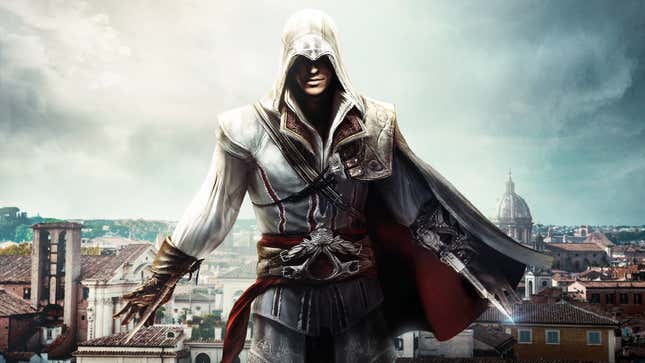
Tencent appears to be doubling down on its investment in Ubisoft. While it already owns 5 percent of the Assassin’s Creed publisher, Reuters now reports the Chinese mega-conglomerate with huge investments throughout the gaming industry has its sights set on becoming Ubisoft’s single biggest shareholder. Its plan for achieving that? Pay double what the stock is worth and buy some of it directly from the Guillemot family.
“Tencent is very determined to nail down the deal as Ubisoft is such an important strategic asset for Tencent,” one source told Reuters. Tencent and Ubisoft have already partnered to bring the latter’s games to China, and the aim of this new deal would reportedly be to help Tencent pivot to bringing its games to a global audience. It’s also been over a year since the company received a new license to release a game in China.
Kotaku previously reported that sources suggested Ubisoft CEO Yves Guillemot was looking for an off ramp amid recent turmoil and departures at the company. Some longtime colleagues have left or were forced to resign, and Guillemot’s own son, Charlie, moved on last year to co-found a fantasy sports NFT startup. A deal like this would be one way to ease the transition.
To make that happen, Reuters reports that Tencent is willing to pay up to nearly $104 a share, more than double what Ubisoft’s stock is currently worth. Some of those shares would come directly from the Guillemot family, which founded Ubisoft in 1986, and currently own roughly 15 percent of it. Others would come from the rest of the public which holds about 80 percent. Tencent already owns 5 percent of the company, but would need to substantially increase that stake to surpass the Guillemot family as its single largest shareholder.
Tencent’s current 5 percent stake came as part of a 2018 deal in which it helped the publisher fend off a hostile takeover attempt by French media conglomerate Vivendi. At the time, Tencent was prohibited from increasing its ownership. That limitation expired earlier this year, however. Reuters reports that Tencent executives visited the Guillemot family in May to outline what a potential deal would look like. Bloomberg previously reported in April that private equity companies were also interested in Ubisoft, which helped rally the stock price at the time.
All of these moves come in the wake of a frenzy of mergers and acquisitions in the video game space. Microsoft proposed to buy Activision Blizzard for $69 billion in January. Sony bought Destiny 2 maker Bungie for over $3.6 billion shortly after. And Take-Two bought Zynga for $12.7 billion.
The consolidation free-for-all has left many asking who will be next, and Ubisoft was a prime suspect. It has a deep catalog of major franchises, including Assassin’s Creed, Far Cry, and Rainbow Six, but is also struggling of late to deliver on some of them. Delays, duds, and turnover among many senior teams have left Ubisoft with a relatively anemic lineup of projects over the next year. And due to global market conditions, Yves Guillemot recently encouraged staff in an email to cut back expenses wherever possible.
Tencent has also faced trouble recently, most notably in the domestic Chinese market where regulatory hurdles stalled new releases. The conglomerate lost tens of billions in the process, with the freeze on new approvals only beginning to thaw earlier this year, though not for Tencent.
Ubisoft would be far from Tencent’s only major investment in the global gaming space. In addition to its own studios across North America and elsewhere, the conglomerate has continued snatching up smaller studios even faster than competitors like Microsoft and Embracer Group. For now, however, it is still only the second-biggest gaming company in the world behind Sony.

